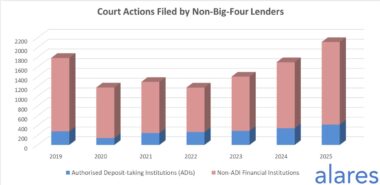For the first time, over half of Australia’s ASX100 companies have received an A grade in relation to their Modern Slavery reporting, according to an annual assessment by the Monash Centre for Financial Studies, part of Monash Business School.
And in a sign of evolving practices, Australia’s largest companies are increasingly seeking active ways to deal with modern slavery they have uncovered in their supply chains, rather than simply reporting on the risks, the report finds.
Companies have reported terminating supply relationships, although a majority are attempting to work through the issues.
Modern Slavery Disclosure Quality Ratings: ASX100 Companies Update 2024 has ranked 56 statements an A grade from a total of 112 ASX100 statements, with 21 per cent receiving a B rating. Seven statements received E and F ratings, and three statements were downgraded.
The results illustrate a substantial improvement compared to the inaugural year of reporting in FY2020, when only 3 per cent were A-rated and 12 per cent B-rated.
Now in its fourth year, the Index is an independent review of the reporting quality of ASX100 companies’ Modern Slavery Statement, which is a mandatory requirement under The Commonwealth Modern Slavery Act 2018.
The Statement requires companies to report on the risks of modern slavery in organisational supply chains, a growing global problem.
Modern slavery describes situations where workers are subjected to coercion, threats or deception to exploit them and undermine their freedom.
Australian companies are often exposed to these risks through the suppliers they use, particularly those with complex international supply chains, posing significant legal and reputational risks.
Over the past four reporting periods, when compared with ratings from FY2020, more than half of the Modern Slavery statements have improved by at least one or two grades.
Senior Research Fellow at Monash Centre for Financial Studies, Dr Nga Pham said assessing the progress of ASX100 companies since the introduction of modern slavery reporting obligations in Australia in 2020 reveals promising improvements.
The report highlighted substantial improvements made by ASX100 companies in key areas of disclosure such as governance, risk assessment, supplier due diligence and collaboration.
According to the report, “the utilities and real estate sectors continue to lead, while the financial and IT sectors lag behind. However, it is noteworthy that the financials and materials sectors dominate the market in terms of both the total number of companies and the number of top-rated statements.”
Dealing with the problem
“In this year's report, we aimed to explore a topic that we are frequently asked about: the most effective ways to report social audit findings and disclose specific instances of modern slavery or, if not modern slavery itself, exploitative labour practices identified that could serve as early indicators of such issues,” Dr Pham said.
“Of the 33 statements reviewed, 73 per cent mentioned continuing the relationship with suppliers/contractors while 6 per cent suspended the suppliers until issues are fixed, 12 per cent terminated due to uncooperative suppliers and 9 per cent did not report on their relationship.
“Companies' commitment to supply chain due diligence appears to reflect a broad focus on engagement and corrective action, with a majority demonstrating a willingness to work with suppliers to address issues rather than resorting to punitive measures.
“This commitment highlights a preference for fostering continuous improvement and building ethical supply chains.”
“The utilities and real estate sectors continue to lead, while the financial and IT sectors lag behind. However, it is noteworthy that the financials and materials sectors dominate the market in terms of both the total number of companies and the number of top-rated statements,” the report states.
Read the full report: Modern Slavery Disclosure Quality Ratings: ASX100 Companies Update.
- ENDS -
MEDIA ENQUIRIES
Helena Powell
Media Communications Officer, Monash University
M: +61 474 444 171
GENERAL MEDIA ENQUIRIES
Monash Media
T: +61 (0) 3 9903 4840
For more Monash media stories, visit our news and events site

